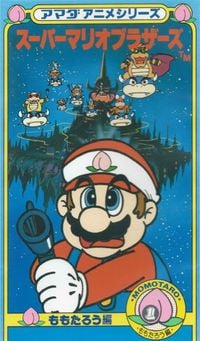Amada Anime Series: Super Mario Bros.: Difference between revisions
mNo edit summary |
Chickasaurus (talk | contribs) mNo edit summary |
||
| Line 3: | Line 3: | ||
{{articleabout|the three OVAs based on well-known fairy tales|the ''Mario'' anime movie|''[[Super Mario Bros.: Peach-hime Kyushutsu Dai Sakusen!]]''}} | {{articleabout|the three OVAs based on well-known fairy tales|the ''Mario'' anime movie|''[[Super Mario Bros.: Peach-hime Kyushutsu Dai Sakusen!]]''}} | ||
[[Image:amadaseries.jpg|right|thumb|200px|The cover of ''Super Mario Momotarō''.]] | [[Image:amadaseries.jpg|right|thumb|200px|The cover of ''Super Mario Momotarō''.]] | ||
The '''''Amada Anime Series: Super Mario Bros.''''' (アマダアニメシリーズ スーパーマリオブラザーズ) is a series of anime is a collection of three original video animations based on fairy tales. It was released only in Japan. The series were released in August 3, 1989. The series used characters and other elements from the ''[[Mario (series)|Mario]]'' series in place of characters and concepts from the original fairy tales. | The '''''Amada Anime Series: Super Mario Bros.''''' (アマダアニメシリーズ スーパーマリオブラザーズ) is a series of anime. It is a collection of three original video animations based on fairy tales. It was released only in Japan. The series were released in August 3, 1989. The series used characters and other elements from the ''[[Mario (series)|Mario]]'' series in place of characters and concepts from the original fairy tales. | ||
The series contains: ''[[Super Mario Momotarō]]'', ''[[Super Mario Issun-bōshi]]'', and ''[[Super Mario Shirayuki-hime]]''. When the titles are read aloud by the narrator, the possessive particle の ''no'' is spoken between "Super Mario" and the name of the specific story; translated, this would render the titles as "Super Mario's Momotarō", etc. | The series contains: ''[[Super Mario Momotarō]]'', ''[[Super Mario Issun-bōshi]]'', and ''[[Super Mario Shirayuki-hime]]''. When the titles are read aloud by the narrator, the possessive particle の ''no'' is spoken between "Super Mario" and the name of the specific story; translated, this would render the titles as "Super Mario's Momotarō", etc. | ||
Revision as of 10:55, June 2, 2013
This article is under construction. Therefore, please excuse its informal appearance while it is being worked on. We hope to have it completed as soon as possible.
The Amada Anime Series: Super Mario Bros. (アマダアニメシリーズ スーパーマリオブラザーズ) is a series of anime. It is a collection of three original video animations based on fairy tales. It was released only in Japan. The series were released in August 3, 1989. The series used characters and other elements from the Mario series in place of characters and concepts from the original fairy tales.
The series contains: Super Mario Momotarō, Super Mario Issun-bōshi, and Super Mario Shirayuki-hime. When the titles are read aloud by the narrator, the possessive particle の no is spoken between "Super Mario" and the name of the specific story; translated, this would render the titles as "Super Mario's Momotarō", etc.
Voice Cast
- Toru Furuya as Mario
- Miyako Endou as Princess Peach, Toad, Morton Koopa Jr., Wendy O. Koopa
- Masaharu Satou as Bowser, Larry Koopa, Iggy Koopa
- Naoki Tatsuta as Luigi, Papa, Roy Koopa, Lemmy Koopa, Ludwig von Koopa
- Toshiko Sawada as Narrator
Episodes
Images
- Peachandgrandparents.jpg
Princess Peach along with Ojiisan and Obaasan. - Peachboyborn.jpg
Mario being born from a peach. - Marioandhammerdad.jpg
Mario rides on Ojiisan's back. Mario attacks Roy Koopa. Mario, Princess Peach, and seven Toads.
Trivia
- Princess Peach using a Mallet to make Mario grow to his normal size in "Issunboshi" might have inspired the "Mini-Mario" technique in Mario & Luigi: Superstar Saga, which involves Luigi hitting Mario with a hammer to make him shrink/grow.
- The idea of Mario befriending several characters originally designed as enemies may have influenced the Paper Mario series.
- The concept of Mario attacking Bowser from inside the Koopa King's own stomach was later used in Super Mario World 2: Yoshi's Island and Mario & Luigi: Bowser's Inside Story, although the former case was with Prince Froggy.





